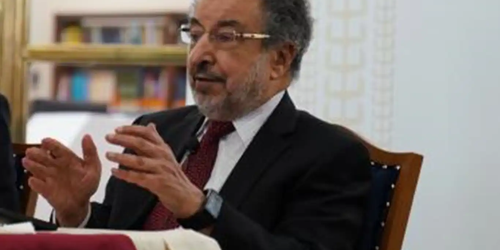The conference, titled "Türkiye's Development and Islamic Economy in the Second Century," presented the Islamic economic system as a potential solution, arguing it could not only alleviate current crises but also significantly boost state revenue.
Organized by the European Academy of Islamic Finance and Economics (EAIFE) alongside Lebanese Jinan University and Malaysia's International Islamic Universities, the virtual conference brought together 30 specialists in Islamic finance and economics from 15 countries. The discussions centered on the potential of the Islamic economic system to provide relief from Türkiye's pressing economic issues, which include high inflation, national debt, and a current account deficit.
Professor Eşref Devabe, chairman of the conference and Professor of Islamic Economics at Istanbul Sabahattin Zaim University, pinpointed the economy as a significant factor in the recent electoral losses of Türkiye's Justice and Development Party (AKP). He blamed runaway inflation for eroding public trust and emphasized that the Islamic economic system could be the key to achieving long-sought economic prosperity.
Devabe pointed out that Türkiye's economic revival continues to be hampered by crippling issues like inflation, debt, and the current account deficit. He further argued that these challenges have been exacerbated by recent global events, including the Russia-Ukraine war, the February earthquake in Türkiye, and the ongoing COVID-19 pandemic.
Abdurrahman Yusri, a professor of economics at Alexandria University, shed light on the core principles of the Islamic economic system, highlighting its focus on achieving justice in trade, maintaining economic stability, and fostering economic progress. He expressed skepticism towards Western economic models, arguing that the interest-based system underpinning the global economy has repeatedly triggered financial crises, leading to the collapse of numerous projects. Professor Yusri stressed the importance of removing obstacles that hinder the implementation of successful Islamic economic alternatives. He also advocated for collaboration among Islamic nations through integration projects to bolster their collective economic power.
Professor Mabid Ali Al-Jarhi of Ankara University of Social Sciences expressed strong views during the conference. He argued that Türkiye's abundant economic resources are under threat of collapse due to the flawed capitalist economic system. Professor Al-Jarhi posited that true economic strength can be achieved by adopting the Islamic economic system. He further contended that Islamic countries collectively face economic hurdles that can only be surmounted through implementing the Islamic economic model. This model, according to Professor Al-Jarhi, holds the key to unlocking social justice, rapid economic growth, sustainable development, and environmentally responsible practices. Professor Al-Jarhi emphasized that the Islamic economic system is not merely a theoretical concept but a ready-to-implement solution. He pointed to Türkiye's sovereignty over money printing as an example, proposing that the Islamic system's approach of printing money based on ownership could triple state revenue, as opposed to the debt-based system currently employed.
The two-day conference covered a broad spectrum of topics pertinent to the Turkish economy. Discussions encompassed the current state of the economy in the context of ongoing crises, the problem of inflation, key economic and social indicators, strategies to bolster Türkiye's role in global development, and forecasts regarding the future of the Turkish economy in light of both internal and external challenges. (ILKHA)

